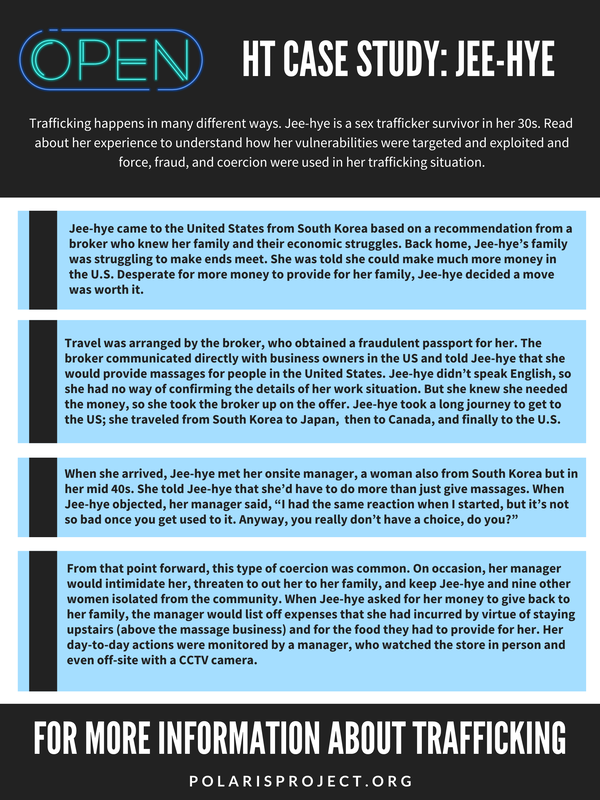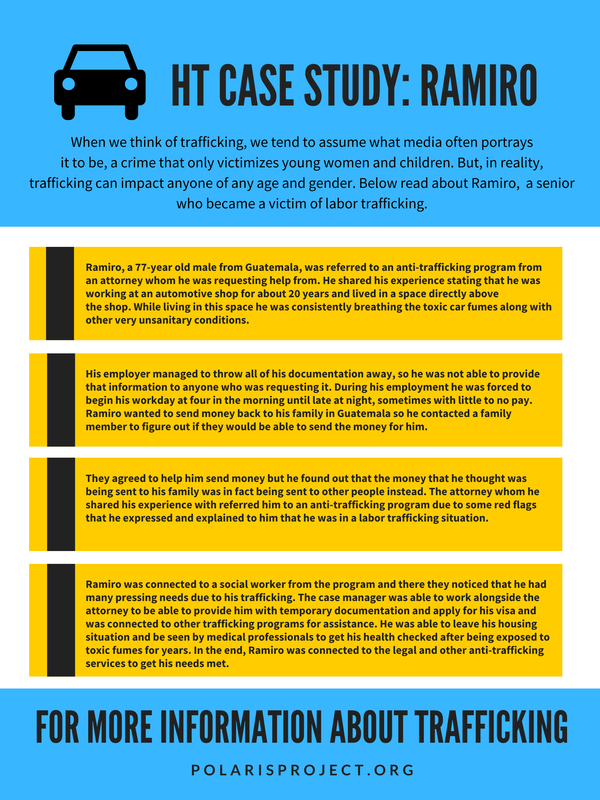|
Today is the last day of National Human Trafficking Awareness Month but that doesn't mean our efforts educate others about the realities of human trafficking stop here! Stay tuned throughout the year for updates, information about virtual events and training opportunities, and more!
1 Comment
In 2020, the Healthcare Subcommittee focused on sharing information and resources amongst the members, discussed how to continue outreach efforts to local nursing and medical programs, and used the model curriculum created in 2019 to train healthcare professionals throughout Chicago. During subcommittee meetings, time was spent reviewing and discussing the latest research pertaining to human trafficking identification and care for trafficked patients in the healthcare setting.
Recognizing the increase in potential contact with survivors due to the pandemic, members of the subcommittee also began a project focused on providing resources for human trafficking victims (and victims of other forms of violence and abuse) for hospitals and clinics to incorporate into the After Visit Summaries they provide to patients. In 2020, the Labor Trafficking Subcommittee launched a National Human Trafficking Awareness Month campaign and participated in activities throughout the year in recognition of the 20th anniversary of the Trafficking Victims Protection Act.
Throughout the year, the subcommittee also: - welcomed new members and hosted guest presenters including folks from the City of Chicago, Illinois state agencies working with migrant and seasonal farmworker services, child and family services - worked with researchers, legal centers and members from other human trafficking task forces from across the country focusing on labor trafficking - participated in the Cook County Human Trafficking Task Force’s annual national human trafficking conference - participated a task force action research evaluation - participated in Semana Laboral (Labor Rights Week) activities - collaborated with member organizations on best practices and supported one another’s campaigns spotlighting domestic workers, agricultural and landscaping workers, temporary workers, and young workers - organized and facilitated labor agency roundtables in response to the COVID-19 pandemic - participated in activities supporting World Day Against Child Labor, and the USDOL’s National Dialogue to Combat Human Trafficking. In 2020, the Victim Services Subcommittee continued to strengthen local service providers ability to meet the needs of vulnerable populations and survivors.
Throughout the year, the subcommittee also: - provided input to the police board on qualities important to look for in a new police chief, emphasizing knowledge of human trafficking and highlighting ways to improve law enforcement response to and interaction with victims - hosted a listening session with DHS for agencies to ask questions about the VTTC program, benefits in general, and other issues related to their clients receiving DHS services - provided an information session about how DV and HT victims can access housing via the Coordinated Entry System The Training Subcommittee spent 2020 conducting numerous virtual trainings for a wide range of audiences, including universities, law enforcement, direct service providers, hospitals and others. For 2021, the Training Subcommittee is excited to continue its goal of providing up-to-date, relevant training content to service providers, law enforcement, first responders, and the general community on human trafficking, know-your-rights, remedies for survivors and other related topics. One of the subcommittee’s main goals for 2021 is to develop tailored train-the-trainer manuals specific to various populations and types of trafficking. We also aim to expand the audiences we deliver training to in an effort to increase identification and appropriate response for trafficking survivors.
In 2020, certain policies took effect that provide greater protective measures for workers in the state of Illinois. The state minimum wage is now at $10 per hour and $14 in the City of Chicago. In response to COVID-19, there are workplace requirements that must be met to ensure the safety and health of workers in Illinois.
Illinois minimum wage: https://www2.illinois.gov/.../minimum-wage-rates-by-year... IDPH poster for Covid-19 safety regulations: https://www.dph.illinois.gov/.../COVID-19_WorkplaceHealth... The U.S. Department of Labor also launched a national online dialogue to seek input and share resources related to labor trafficking. Read and check out the ideas folks shared here: https://endtrafficking.ideascale.com/ Human Trafficking rarely stands alone as a crime against an individual. Often, Survivors are also victims of additional crimes perpetrated against them due to the exploitation. It is common for survivors to experience the intersectional trauma of domestic violence, sexual assault, and stalking before, compounded with, or after the trafficking situation.
Effective January 1st, 2021, Under the Illinois Address Confidentiality Program, Illinois Law expanded the Address Confidentiality for Victims of Domestic Violence Act, an important piece of legislation to better protect the privacy of survivors, to also cover those who are survivors of sexual assault and stalking. This allows individuals further protection from perpetrators by providing an alternative address instead of their real address. This expansion will allow many survivors of trafficking who have lived experience of domestic violence, sexual assault, and/or stalking to have access to additional safety measures and added privacy for their location and documents. Read more about House Bill 2818 and the newly re-named Address Confidentiality for Victims of Domestic Violence, Sexual Assault or Stalking Act here: https://chicago.suntimes.com/2020/12/30/22206084/illinois-new-laws-2021-insulin-dna-domestic-violence-minimum-wage-increase Check out how hospitals around the country are creating policy for identification and response to human trafficking:
“One of the big red flags is when people delay coming in for medical care, such as waiting weeks to come in to get an injured ankle or sexually transmitted infection checked out, Macias-Konstantopoulos says. Or it may be a pattern of injuries that don't make sense. Sometimes people are reluctant to explain their injury, or they come in with someone who seems overbearing.” Read more here: https://www.npr.org/sections/health-shots/2018/07/24/631517533/hospitals-gear-up-for-new-diagnosis-human-trafficking |
NHTAM 2021Every day in January, we posted content created by members of our task force to highlight the realities of human trafficking locally and nationally. Learn about the impact of COVID-19 on human trafficking, how to separate fact from fiction about how trafficking happens and become knowledgeable about recent cases, relevant research, policies and resources for survivors and advocates. ArchivesCategories |


 RSS Feed
RSS Feed